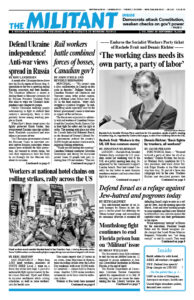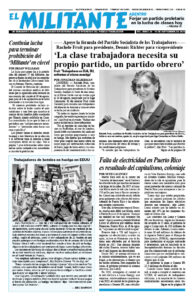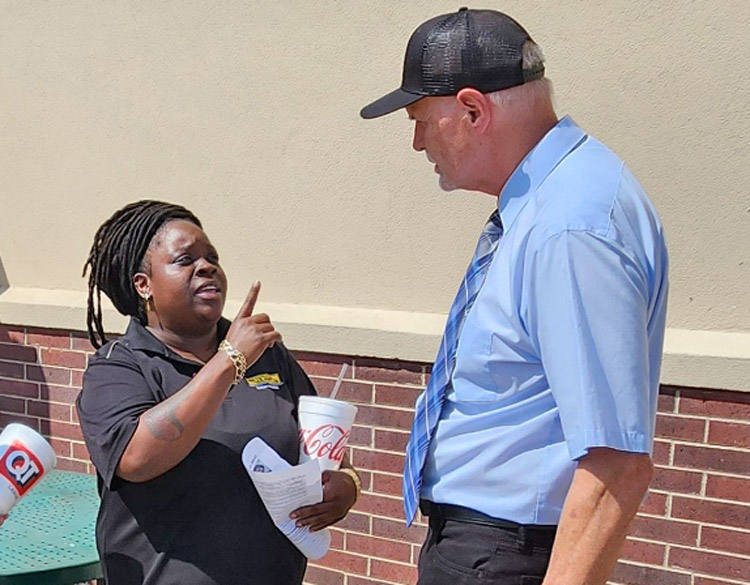FORT WORTH, Texas — “We need to build a party of labor for all of us workers,” Dennis Richter, the Socialist Workers Party candidate for U.S. vice president, told truck driver Patrick Edgar Brooks at the Pilot truck stop here Aug. 28, part of a three-day campaign tour in the area. Truckers Richter met described protests that fellow drivers held recently against conditions on the U.S.-Mexico border, where they’re forced to wait in their trucks for hours unpaid and without bathrooms.
“A labor party would be based on the unions, with the 14 million workers in this country who are organized, but needs to include the many millions more who are not in unions, like independent truckers,” he said.
Brooks told Richter that he and his wife are concerned that they will not be able to provide what their children need due to persistently high prices and their job options. Richter pointed to the need for a union-led fight for jobs with wages, schedules and conditions that make it possible for workers to sustain families.
He also spoke to Shawnta Hamerter, a driver from San Antonio.
“The last time I voted was for Obama,” Hamerter said. “He did nothing for us. They always say they will do things for us but they never do. We need to break from the entire government. We keep the country going.”
“Workers produce the wealth and we get wages that are not enough to survive on,” Richter said.
“The company I work for gave us a 4% wage increase but took it away by increasing other things we pay for. What can we do?” Hamerter asked.
“A lot of workers think it is just me and feel powerless,” Richter replied. “A party of labor would unify working people into a social movement to fight in our interests.”
“I have never qualified for assistance,” Hamerter added, “but yet they send billions to other countries.”
“What the government does abroad is to maintain the interests and profits of the capitalists,” Richter said, pointing to the need for the working class to advance its own foreign policy based on workers’ common class interests worldwide.
“They do to them as they do to us,” Hamerter said. She got a subscription to the Militant and endorsed the SWP presidential ticket.
Richter recently returned from campaigning in Australia. When he spoke at an area-wide meeting here Aug. 24, he explained that working people in that country follow what is happening in the U.S. because of the role the rulers here play in the world. He noted that Washington has the world’s biggest military, including tens of thousands of soldiers stationed in Asia.
Richter described how the Republican and Democratic parties have taken steps to refurbish their image. The Democrats now increasingly base themselves on the millions-strong upper middle class, a self-designated “enlightened meritocracy.” Meanwhile, “the Republican Party is trying to set itself up as the party of the working class,” he said. More and more workers question whether either of the two main bosses’ parties have anything to offer other than assaults on living standards, high prices and more wars.
“Every class struggle is a political struggle,” Richter said. “This understanding is what workers in the U.S. are finding out in their own lives and battles.
“And every political question we face in this campaign needs a class answer,” he added.
He described the picket lines of striking nurses that SWP campaign supporters have joined in many states, and also in Australia where he campaigned alongside members of the Communist League.
The SWP candidate pointed to the tens of thousands of workers in North America — IAM mechanics at Boeing, dockworkers, hotel and postal workers — in crucial contract fights, preparing to, or already on strike. Solidarity with these fights is crucial, he said, alongside support for rail workers in Canada who went on strike recently and are fighting both the bosses and the government over schedules and safety.
“The working class and our unions had been in retreat since the 1990s. But this retreat has come to an end,” Richter said, pointing to strikes and other battles waged by the unions in the last five years.
Example set by Cuban Revolution
A participant at the meeting asked why some commentators were comparing protests at the recent Democratic National Convention with those that took place there in 1968. “The anti-Vietnam War movement was different than what is happening today,” Richter said. “That movement targeted Washington’s imperialist assault and it built on the victories being won by the civil rights movement that overturned Jim Crow segregation.” Those protesting at the DNC today, he said, are supporters of Hamas, a reactionary anti-working-class outfit.
Richter noted that there were political currents in the 1960s that didn’t look to the working class, particularly Maoist currents. They influence the pro-Hamas actions today. These middle-class radicals “look to violence and ultra-left actions. They look at the masses as objects, the opposite of the course advanced by V.I. Lenin and Fidel Castro,” the central leaders respectively, of the Russian and Cuban revolutions.
Richter pointed to remarks by Asela de los Santos, a leader of the Cuban Revolution, when she was asked to summarize the Cuban Revolution in one word. She said, “participation.”
Organizing solidarity and deepening involvement in the class struggle today opens the door to advancing workers’ self-confidence, fighting capacities and class consciousness. That’s the course the SWP presents as the only road to advance the fight for workers to take power into our own hands.


